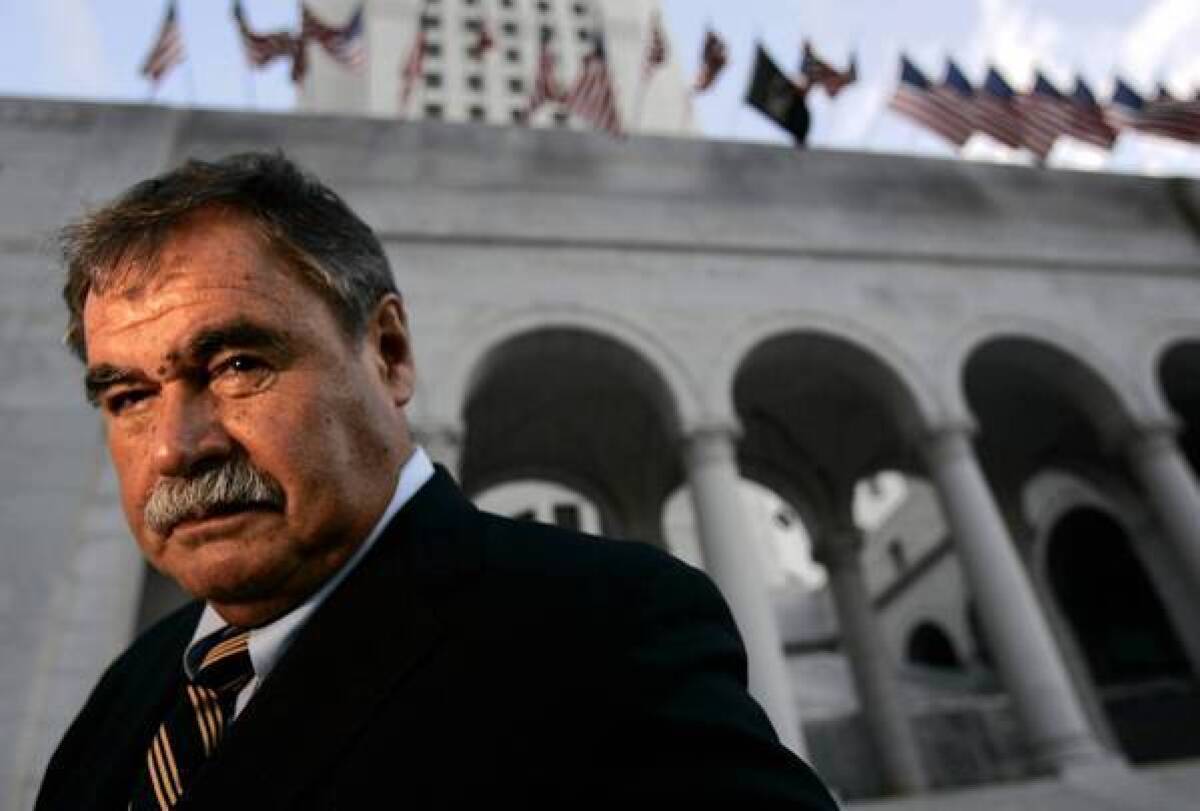Sal Castro dies at 79; L.A. teacher played role in 1968 protests

- Share via
Sal Castro, a veteran Los Angeles Unified School District teacher who played a central role in the 1968 “blowouts,” when more than 1,000 students in predominantly Latino high schools walked out of their classrooms to protest inequalities in education, died in his sleep Monday after a long bout with cancer. He was 79.
Castro died at his home in the Silver Lake district, seven months after he was found to have stage 4 thyroid cancer, said his wife, Charlotte Lerchenmuller.
In March 1968, Castro was a social studies teacher at Lincoln High School near downtown when he helped instigate the protests that became a seminal event in the development of the Chicano movement. Students at five high schools — Belmont, Lincoln, Wilson, Roosevelt and Garfield — abandoned their campuses in a dramatic bid to remedy overcrowded and run-down schools, soaring dropout rates, poorly trained teachers, and counselors who steered Latino students into auto shop instead of college-prep classes.
The conditions were so poor, he told The Times 20 years later, it was “like American education forgot the Latino kid.”
The protests, which lasted several days and spread to 15 schools, resulted in the arrests of 13 people on conspiracy charges. Castro was among the 13 who were jailed but eventually exonerated.
Fired after the walkouts, he fought successfully to be reinstated to his teaching position but was transferred several times to schools that had largely non-Latino enrollments.
Broad public recognition of his contributions to the struggle for education equality came decades after the protests, when his story was told in films, including “Walkout,” the 2006 HBO movie directed by Edward James Olmos.
“For Latinos in Los Angeles,” Supervisor Gloria Molina said in a statement Monday, “Sal Castro was as influential and inspirational as United Farm Workers co-founder Cesar Chavez was nationally — an example of the power of organizing who personified the possibility of overcoming seemingly insurmountable odds.”
The son of Mexican immigrants, Castro was born in Boyle Heights on Oct. 25, 1933, and spent some of his early childhood in Mexico, where he learned to read in Spanish.
When he returned to Los Angeles for second grade, his teacher made him sit in a corner because he was the only student who could not speak English. Instead of accepting the stigma, “I started thinking, these teachers … should be able to understand me,” he said in a 1988 interview with The Times. “I didn’t think I was dumb — I thought they were dumb.”
He graduated from Cathedral High School in 1952, was drafted into the Army and served in the Korean War. After completing his service, he attended Los Angeles City College and majored in business at Cal State L.A., graduating in 1961.
That year, he also earned a credential to teach secondary school and taught junior high in Pasadena before landing a position at Belmont High. He soon began pressing for change. He urged Mexican American students to run for student government offices, causing a ruckus when he encouraged them to give campaign speeches in Spanish.
In 1963, he founded the Chicano Youth Leadership Conference, a nonprofit organization that trained future leaders at annual workshops held until 2009, when it lost its funding.
Transferred to Lincoln High after the incident at Belmont, he worked with students and recent graduates to present a list of demands to the school board aimed at improving academic opportunities and fixing dilapidated classrooms.
Tensions came to a head on March 5, 1968, after administrators at Wilson High abruptly canceled a student production of “Barefoot in the Park” that they said was too risque. Word of the action spread quickly, and soon Latino students were leaving classrooms across the district, joined by Castro and others outside the schools, including college students and members of the militant Brown Beret.
Among the participants were some future politicians and activists, including Los Angeles Mayor Antonio Villaraigosa, who walked out from Cathedral High, and filmmaker Moctesuma Esparza, who was indicted for his leadership role in the walkouts and decades later was executive producer of the HBO film on the protests.
Castro was jailed for five days after the walkouts and lost his job, but he was rehired after weeks of protests by Eastside parents. Months after the protests, 40 teachers at Lincoln High asked to be transferred if the district allowed Castro to return.
After a long period of “freeway therapy,” when he was bounced around to different schools and made a substitute teacher, he landed back at Belmont, where he taught and counseled hundreds of students from 1973 until his retirement in 2004.
Many of his students became educators, including several who are principals, Lerchenmuller said.
In 2010, district officials honored the outspoken educator by dedicating a school to him, Salvador B. Castro Middle School, which shares Belmont’s campus.
Although Castro continued to lament high dropout rates and other problems, he discouraged students who wanted to launch new walkouts, arguing that staying in school was more important.
“Here’s the protest: any kid with a book,” he said, gesturing at the youthful crowd attending a 2008 symposium on Chicano activism at Cal State San Bernardino. “That’s the only way we can move forward, through education.”
In addition to his wife, Castro is survived by two sons, Gilbert and Jimi; and two grandsons. Services will be announced.
More to Read
Start your day right
Sign up for Essential California for the L.A. Times biggest news, features and recommendations in your inbox six days a week.
You may occasionally receive promotional content from the Los Angeles Times.







